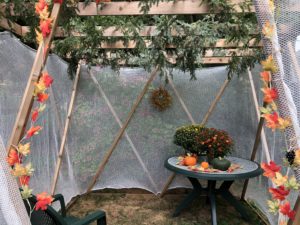 As Sukkot, the Jewish harvest festival, begins, I present “Stories in the Sukkah” a video of three stories about food, generosity, appetite, scarcity and plenty. The tradition is to spend time in a temporary dwelling, open to the elements, acknowledging the fragility of shelter, and the cycles of seasons, growing and harvest.
As Sukkot, the Jewish harvest festival, begins, I present “Stories in the Sukkah” a video of three stories about food, generosity, appetite, scarcity and plenty. The tradition is to spend time in a temporary dwelling, open to the elements, acknowledging the fragility of shelter, and the cycles of seasons, growing and harvest.
My experience with growing food goes back to when I was a teenager. “I want to plant a garden and grow some food,” I told my parents. My family was living in suburban New Jersey at a time when hippies were “living on the land” and this utopian ideal caught my fancy. Our yard had a concrete patio and a lawn edged with shrubs and a couple of trees. My parents agreed that I could dig up a small patch of the grass next to the garage. I got blisters on my hands but I sweated it out. I planted strawberries, of all things – not the easiest to grow or the most practical – but even the scant crop of sweet fruit brought me pride and satisfaction.
I’ve been thinking a lot about food these last seven months. Amid the early pandemic overstocking craze as we all feared illness and scarcity, I began to make regular donations to my local food pantry. I felt a renewed sense of gratitude that I had the privilege of having enough to eat, and I was aware of the increasing numbers of people who did not.
Like many others, my family expanded our vegetable garden this spring. Despite the many critters who claimed some of our produce, we enjoyed countless meals with food grown in our garden. Each dinner we’d announce, almost as a blessing, “the zucchini is from the garden, the kale is from the garden.” I find this brings satisfaction like nothing else, so basic and good, not to mention delicious. The fact that one seed can grow into a plant that produces so much food is nothing short of miraculous.
Recently I taught a (virtual) family education session for sixth graders at the temple where I work. We were discussing how they might participate in social action projects addressing food insecurity. I told them that in Massachusetts the percentage of food insecure households has more than doubled since March, up to nearly 18%. And food insecurity is disproportionately impacting Black and Latinx households. (statistics according to projectbread.org) Together we read this inspirational quote from Elie Wiesel: “True, we are often too weak to stop injustices; but the least we can do is protest against them. True, we are too poor to eliminate hunger; but in feeding one child, we protest against hunger… we affirm a human’s right to live.” (Sages and Dreamers)
During Sukkot there is a tradition of welcoming and inviting guests, including our ancestors. Whether or not you are Jewish, or ever heard of this holiday before, whether or not you have a sukkah, I welcome you to mine. Enjoy “Stories in the Sukkah”and if you are able, please help those dealing with food insecurity and hunger by donating to your local food pantry or a food justice organization of your choice. Thank you!
